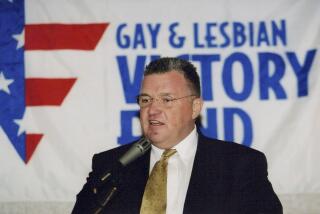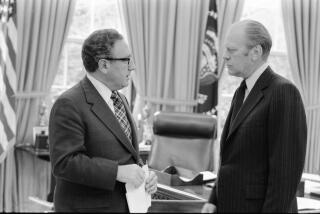Warren Christopher dies at 85; Clinton secretary of State’s quiet diplomacy was prized from Washington to L.A.
Warren Christopher, the former secretary of State and eminence grise of the Democratic Party whose achievements in a wide-ranging public career include brokering the Bosnian peace agreement for the Clinton administration and leading an independent investigation of the Los Angeles Police Department that brought important reforms after a notorious police beating, has died. He was 85.
Christopher died Friday at his home in Los Angeles of complications from bladder and kidney cancer, said Kathy Osborne, his executive assistant at the law firm O’Melveny & Myers, where Christopher was a senior partner.
Called “the best public servant I ever knew” by President Carter, Christopher was known as a skilled negotiator whose tenacity, decorum and discretion were prized traits in crises.
As deputy secretary of State in the Carter administration, he played a pivotal role in securing the release of the Americans held hostage in Iran. As secretary of State for President Clinton, he kept warring parties at the table during the Dayton, Ohio, peace talks between the Bosnians and Serbs. After returning to private life, he served as Vice President Al Gore’s emissary in the Florida vote recount that settled the disputed 2000 presidential election.
When Los Angeles fractured along racial lines after the 1991 police beating of Rodney G. King, Christopher was drafted to head the Independent Commission on the Los Angeles Police Department, which quickly became known as the Christopher Commission. Under his leadership, the 100-day inquiry produced a plan for the department’s overhaul, including a strong call to replace Chief Daryl F. Gates, who later resigned.
The unity of the commission — which included members selected by Gates and his main antagonist, Mayor Tom Bradley — was in large measure a testament to its self-effacing chairman and his quiet diplomacy.
“Most talking is not glamorous,” he once said. “Often it is tedious. It can be excruciating and exhausting. But talking can also tame conflict, lift the human condition and move us close to the ideal of peace.”
Unfailingly courteous and calm, Christopher was known for keeping his emotions in check under the most trying circumstances. He sometimes told the story of the time he was a deputy attorney general in the Lyndon Johnson administration and the president called him in the middle of the night. He lunged for the phone and broke his toe but concealed the accident — and the throbbing pain — for the entire conversation.
That was a small reminder of the stamina that went on public display during his tenure as secretary of State, when Christopher logged more miles in pursuit of American objectives than any previous secretary in a four-year period. That record was built in part by his efforts to revive Middle East peace talks, which led him to make 35 trips to Israel and 24 to Syria.
But the lean, sober-faced diplomat was often portrayed by critics as weak and ineffectual. During his four years in the Clinton Cabinet he was faulted by Washington insiders for failing to articulate a coherent vision for American foreign policy in the post-Cold War era.
One of his sharpest critics, former national security advisor Zbigniew Brzezinski, said Christopher’s weakness was his desire to “litigate issues endlessly, to shy away from the unavoidable ingredient of force in dealing with contemporary international realities and to have an excessive faith that all issues can be resolved by compromise.” Skeptics called him “Dean Rusk without the charisma,” comparing him to the Johnson-era secretary of State who was also known for his low-key style.
Gore, however, offered a different vision of Christopher, calling him “one of the great statesmen of our era.” Beginning with the Carter era and during his tenure under Clinton, Christopher developed human rights “as a pillar of our working diplomacy,” Gore said in a statement Saturday. “He methodically reviewed every element of American diplomatic practice, and by the time he was finished, human rights were welded, bolted and wedged into the core where they remain to this day.”
After every stint in public service, Christopher returned to O’Melveny & Myers, the influential, old-line Los Angeles law firm where he began his career six decades ago and which he eventually led as chairman. He was credited with expanding the firm’s international operations as well as its civic engagement, especially through pro bono projects.
Warren Minor Christopher, the fourth of five children, was born Oct. 27, 1925, in Scranton, N.D., a prairie town settled at the turn of the 20th century by Scandinavian and German immigrants.
His mother, Catherine, helped the needy, including hobos who found their way to the family’s doorstep from freight cars that ran near their home. She always declined the men’s offers to work in exchange for supper because she believed “that our relatively good fortune was something to be shared, not bartered,” Christopher wrote in “Chances of a Lifetime,” his 2001 memoir.
His father, Ernest, managed the local bank and was well-liked despite having what Christopher described as the demeanor of “a taciturn Norwegian Lutheran.” He said later that he was profoundly affected by his father’s stories about how the Depression ruined many farmers in town and his struggles to resist foreclosing on their mortgages. Christopher said the strains of trying to keep the bank afloat while many of his friends and neighbors went under led to his father’s incapacitating stroke in 1937 when he was only 49. Ernest Christopher died five years later.
What he learned from his father was that “you do not have to make a public display of compassion to be a compassionate person,” Christopher wrote in his memoir. “The human scenes I witnessed in the flat, dry North Dakota plains while at my father’s side may account more than anything else for the tilt of my social and political concerns in the direction of the unfortunate.”
Catherine Christopher moved the family to California in 1939 and went to work as a salesclerk. Warren earned money delivering papers for the Hollywood Citizen-News and excelled on the debate team at Hollywood High School.
At 16 he entered what is now the University of Redlands on a debate scholarship, but transferred after a year to the Naval Officer Program at USC. He graduated in 1945 as an ensign. He served on an oil tanker in the Pacific theater as World War II was winding down.
In 1946, he entered Stanford, where he was chosen to serve as editor of the first Stanford law review. In 1949 he became the first Stanford law student to be placed in a clerkship with a U.S. Supreme Court justice.
During his year with legendary Justice William O. Douglas, he helped craft opinions on cases challenging the separate-but-equal education doctrine that would influence the court’s language in the historic Brown vs. Board of Education decision of 1954. Douglas became an important mentor, whose advice to Christopher was to “get out into the stream of history and swim as fast as you can.”
In 1950 Christopher became one of the first Democrats to join the conservative O’Melveny & Myers law firm. Eight years later, he became a partner and began his political ascent as a part-time researcher and speechwriter for then-California Atty. Gen. Edmund G. “Pat” Brown, who was running for governor. After Brown’s landslide victory over U.S. Sen. William F. Knowland, Christopher joined him in Sacramento as special counsel.
In 1965, Brown tapped him to assemble and serve as vice chairman of a bipartisan panel to study the causes of the riots that had inflamed the Watts neighborhood of Los Angeles that year. Named the McCone Commission after its chairman, Republican businessman and former CIA Director John McCone, it faulted authorities for moving too slowly to quell the violence and urged some modest police reforms. Watts would provide the first of several opportunities that Christopher would have to examine urban violence firsthand.
In the summer of 1967 he joined the Johnson administration as deputy to Atty. Gen. Ramsey Clark. He had been on the job only two months when rioting broke out in Detroit. Dispatched to that city to evaluate the situation with Deputy Secretary of Defense Cyrus Vance, he advised President Johnson to send in the 82nd Airborne to shore up the Michigan National Guard. Forty-three people died in the unrest there.
Christopher later helped calm riots in Washington and Chicago, where he coordinated efforts by the Army and local authorities to control disruptions by anti-Vietnam War protesters at the 1968 Democratic National Convention. He prosecuted Chicago police officers charged with brutality.
He also helped lead the Johnson administration’s push for the Civil Rights Act of 1968. A follow-up to the Civil Rights Act of 1964, it prevented discrimination in the sale, rental and financing of housing. Ramsey described Christopher as a “major force” behind its passage.
A decade later, when Vance became Jimmy Carter’s secretary of State, he recruited Christopher to serve as his deputy. Christopher, who was confirmed in 1977, was entrusted with some of the Carter administration’s most delicate foreign policy assignments, from leading the effort to win congressional approval of the Panama Canal treaties to ending formal ties with the Chinese Nationalist government on Taiwan and negotiating a framework for future relations.
The full measure of his talent at negotiation was highlighted by the crisis that developed Nov. 4, 1979, when Iranian students, angry over U.S. sheltering of Iran’s deposed shah, seized the American Embassy in Tehran and took 52 officials and staffers hostage. The drama would span Carter’s last 14 months in office, the lowest point of which was a botched helicopter rescue that left eight American servicemen dead.
Vance, who had disapproved of the mission, stepped down and Carter named Sen. Edmund S. Muskie (D-Maine) as his successor. Christopher was deeply disappointed at being passed over, but decided that he had to stay. “I had accepted the job of deputy without reservation or promise of advancement,” he reflected years later. “To leave now out of disappointment at my failure to advance would be to elevate ambition over commitment, pride over duty.”
He soon found himself in a crucial role.
It began in September 1980, when West Germany relayed a secret message to the Carter administration that a high-level Iranian official wanted to meet in Bonn with a senior American official. The Iranian was Sadegh Tabatabai, a member of Ayatollah Ruhollah Khomeini’s inner circle. Tabatabai’s overture to the U.S. was the first time in the then-10-month-old hostage crisis that an Iranian with direct ties to Iran’s leadership had asked for a meeting. Carter sent Christopher to Bonn and put him in charge of negotiations. Freeing the hostages would consume Christopher’s life for the next four months.
The Algerian government agreed to mediate the cumbersome negotiations, which had to be translated into three languages — Persian, French and English — in order for all parties to communicate. With Iran demanding $14 billion in frozen assets and $10 billion of the shah’s wealth that it claimed was being held in the U.S. — amounts that stunned U.S. officials, whose estimates were much smaller — Christopher employed a small army of bankers and lawyers to locate the funds and surmount the legal and bureaucratic hurdles blocking their release.
By early January, with only a few weeks left in the Carter presidency, Christopher decided to streamline the process by flying to Algiers with a core group of aides. He directed the final 13 days of the negotiations from the Algerian capital.
What Carter administration officials later described as the largest financial transaction in history, involving an intricately choreographed series of wire transfers totaling almost $8 billion and involving 14 banks — including the U.S. Federal Reserve, the Central Bank of Algeria and the Bank of England — was concluded in the last hours of the Carter presidency.
As the architect of the agreement, Christopher had taken “what was by almost any standard a policy disaster for the United States and turned it into a triumph of U.S. interests,” Gary Sick, the principal White House aide on Iran, told The Times in 1993.
By the time the hostages were flown out of Iran, Carter had been out of office for 35 minutes. Christopher was on the tarmac in Algiers when their plane landed and greeted each of the hostages by name.
“He was the interlocutor between the White House and Iran,” Carter said of his loyal deputy years later, “and it was his determination and his courage and his ability as a negotiator and his wisdom that resulted in the release of every American hostage, safe and free.”
When Christopher went to dinner at a Washington restaurant the day after the hostages’ release, fellow diners applauded him. Their overt display of gratitude stunned the shy deputy, who had to be told that the applause was for him.
“What struck me then, as it does now,” Christopher later wrote, “is how very strange, nearly magical, life can be. Who could have predicted only nine months before that one of the luckiest things ever to happen to me would be not being named secretary of state? Not finding myself in a job that would have kept my feet firmly planted in Washington?
“The lesson I draw from this chapter of my life is simple, and a little ironic: the chance of a lifetime is not necessarily the next rung up the ladder. It may be the one on which you already stand.”
By 1991, Christopher was an elder statesman of Los Angeles with little need for more high-stakes headaches. But on March 3, an LAPD car chase ended in the brutal beating of Rodney G. King by several officers. A witness captured the beating on videotape, which showed other officers standing by and doing nothing to stop the vicious attack by their colleagues. Most of the officers involved in the incident were white; King was black.
When Christopher viewed the videotape two days later, he was “sickened and angry.” When he urged Bradley to launch an independent investigation, the mayor insisted that Christopher head it. Against the advice of some of his closest friends, he agreed.
Some skeptics wondered whether the chairman of an establishment law firm would be bold enough to call for radical changes. The answer came 100 days later in a scathing 228-page report that found that a significant number of Los Angeles police officers condoned racism and used excessive force.
The commission recommended sweeping changes, including an overhaul of the department’s disciplinary system and a move toward community policing. But its most controversial recommendation was that Gates, who had served 13 years as chief, step down.
The call for Gates’ resignation had been unanimous, remarkable considering that what became known as the Christopher Commission had begun as two separate panels — one appointed by Bradley and the other by the embattled chief. Christopher brought the two bodies together. He presided over five fractious community hearings and a staff of 50 lawyers and 60 accountants who interviewed 300 current and former officers and reviewed 1 million pages of documents.
Throughout the investigation, Christopher displayed “a grasp of the sociological context,” Stanley Sheinbaum, the Police Commission president who engineered Gates’ departure with the help of the Christopher Commission report, told The Times in 1993. “I don’t know how you would define vision, but he sure got an understanding of the context of the problem that was better than anyone’s.”
Christopher later led the successful campaign to pass Charter Amendment F, which revamped LAPD management, including the system for hiring and firing the chief and disciplining officers.
“Warren Christopher set the city on a path toward healing wounds that had festered for generations,” county Supervisor Mark Ridley-Thomas said Saturday. “That work continues today, but without his leadership on the commission, without his position as a significant legal and moral counterweight to Chief Daryl Gates, we would not have seen the progress that is now universally acknowledged.”
Christopher is survived by his second wife, the former Marie Wyllis, whom he married in 1956 after his first marriage ended in divorce; and their three children, Scott, Thomas and Kristen. He also is survived by a daughter from his first marriage, Lynn Collins; and five grandchildren. Private services are pending.
More to Read
Start your day right
Sign up for Essential California for the L.A. Times biggest news, features and recommendations in your inbox six days a week.
You may occasionally receive promotional content from the Los Angeles Times.







